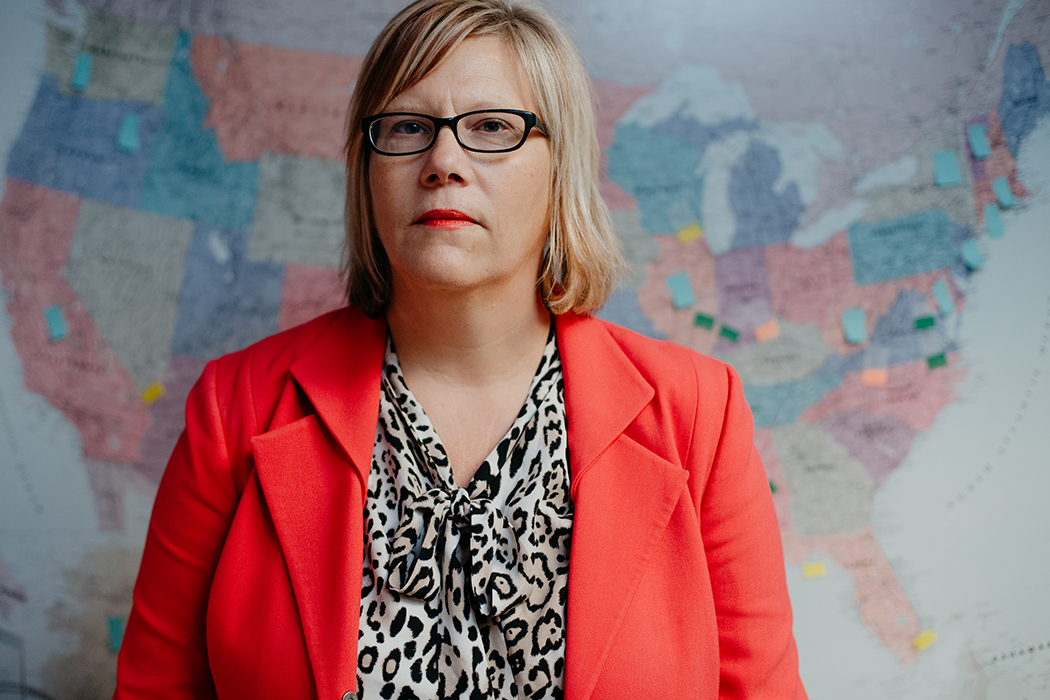“Right now, Virginia is seen as a haven state,” says national abortion rights advocate Amy Hagstrom Miller. But all that could change with one Supreme Court decision, as Hagstrom Miller knows all too well: She’s lead plaintiff in the challenge to Texas’ Senate Bill 8, which is aimed at undermining the right to choose established in Roe v. Wade.
Hagstrom Miller is founder, president, and CEO of Whole Woman’s Health, the operator of nine clinics offering gynecological services and abortions in five states, including Virginia-—Charlottesville became its corporate headquarters when her family moved here in 2016. She has been a leader in efforts around the country to fight outdated and restrictive abortion laws and regulations. In Virginia, her advocacy group, Whole Woman’s Health Alliance, worked with many other reproductive rights supporters to pass last year’s Reproductive Health Protection Act. The Virginia legislation repealed requirements for 24-hour waiting periods, medically unnecessary ultrasounds, biased counseling, and other restrictive provisions.
In other states, however, the anti-abortion lobby has been successful in passing burdensome and unnecessary requirements, so-called TRAP laws (Targeted Restrictions on Abortion Providers), and trigger laws designed to reinstate abortion bans in the event that Roe is struck down.
“It’s important to connect Virginia to the rest of the country,” Hagstrom Miller says. “Virginia will not be fine if Roe falls.”
Women’s health and reproductive rights have been Hagstrom Miller’s mission for almost 30 years. “[Whole Woman’s Health’s] main lane is providing the best possible reproductive health services,” she says, based on viewing abortion as just one part of the health care support system needed to enable women (and their partners) to make their own reproductive decisions.
“Almost 70 percent of our clients are parents already,” she notes. “Most of them [make the decision to] have an abortion because they can’t afford another child.” The real issue, in her view, is the need to make sex education, family planning, and reproductive health care available and affordable to all people. But apparently, that’s something that has to be fought for.
In 2013, Hagstrom Miller agreed to serve as lead plaintiff in Whole Woman’s Health v. Hellerstedt, challenging a Texas law requiring abortion providers to obtain local hospital admitting privileges, even though the great majority of abortions are not surgical procedures. By 2016, when the U.S. Supreme Court finally struck down the law as imposing an undue burden and therefore unconstitutional, almost half of Texas’ abortion clinics had already been forced to close.
Texas’ latest anti-abortion effort, SB 8, prohibits abortion after six weeks (before most women even know they are pregnant) and allows citizens to bring “bounty hunter” lawsuits against anyone “aiding and abetting” an abortion. The Supreme Court’s refusal to issue an injunction while legal challenges to the law are under way was “shocking,” Hagstrom Miller says. “I was surprised that the Supreme Court issued this statement in a shadow docket, without a trial hearing.” The Supreme Court has agreed to review a Mississippi law banning abortions after 15 weeks. That legislation, in fact, was specifically designed to draw legal challenges and thus create an opportunity for the newly conservative court to overturn Roe.
With this heightened focus on anti-abortion efforts, Hagstrom Miller says Virginians can’t afford to be complacent about access to choice. The Reproductive Health Protection Act only passed when Lieutenant Governor Justin Fairfax cast his tie-breaking vote in the state Senate; restrictions on funding abortions for public employees or those on Medicaid are still in place.
With anti-abortion challenges likely next year, voting in November’s off-year elections (when voter turnout is historically much lower) is “critical,” says Hagstrom Miller. Democratic candidate Terry McAuliffe promises to try to enshrine abortion protections in the Virginia Constitution, a process that requires a citizen referendum. Republican candidate Glenn Youngkin, meanwhile, has said he’ll “go on offense” against abortion rights.
Charlottesville and Albemarle County’s four delegates are likely to vote along party lines on abortion rights. Statewide, the critical factor will be which party ends up in the majority. Democrats currently hold a 55-45 advantage in the House of Delegates, and a slim 21-19 edge in the state Senate. With one Democrat likely to vote with the GOP on abortion issues, whoever is in the lieutenant governor’s seat could be casting a tie-breaking vote.
“Abortion access has always been used as a political football,” says Hagstrom Miller. “It’s critical that we maintain these freedoms,” especially with the potential for Roe to be overturned or substantially eroded.
“I have a map hanging in my office that I’m looking at 24/7,” she says. The map shows abortion laws in each state. Only a few have codified the right to reproductive choice in their constitutions or through legislation. But 50 years ago, before Roe, abortion was illegal in 30 states and only allowed under certain conditions in the other 20—not a place Hagstrom Miller wants to go back to.
